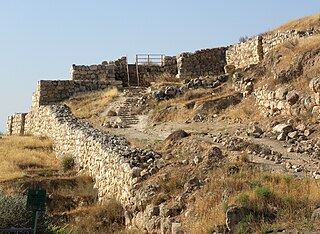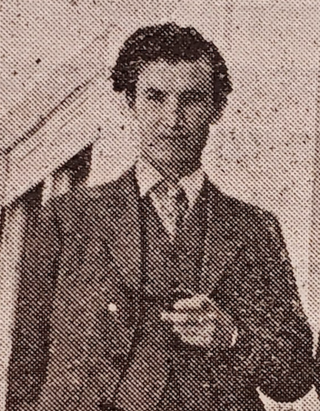Related Research Articles

Tel Aviv-Yafo, usually referred to as just Tel Aviv, is the most populous city in the Gush Dan metropolitan area of Israel. Located on the Israeli Mediterranean coastline and with a population of 474,530, it is the economic and technological center of the country. If East Jerusalem is considered part of Israel, Tel Aviv is the country's second-most-populous city, after Jerusalem; if not, Tel Aviv is the most populous city, ahead of West Jerusalem.

The 1948 Arab–Israeli War, also known as the First Arab–Israeli War, followed the civil war in Mandatory Palestine as the second and final stage of the 1948 Palestine war. The civil war became a war of separate states with the Israeli Declaration of Independence on 14 May 1948, the end of the British Mandate for Palestine at midnight, and the entry of a military coalition of Arab states into the territory of Mandatory Palestine the following morning. The war formally ended with the 1949 Armistice Agreements which established the Green Line.

Lachish was an ancient Canaanite and Israelite city in the Shephelah region of Israel, on the south bank of the Lakhish River, mentioned several times in the Hebrew Bible. The current tell (ruin) by that name, known as Tel Lachish or Tell ed-Duweir, has been identified with the biblical Lachish. Today, it is an Israeli national park operated and maintained by the Israel Nature and Parks Authority. It lies near the present-day moshav of Lakhish.
Plan Dalet was a Zionist military plan executed in the civil war phase of the 1948 Palestine war for the conquest of territory in Mandatory Palestine in preparation for the establishment of a Jewish state. The plan was requested by the Jewish Agency leader and later first prime minister of Israel David Ben-Gurion, and developed by the Haganah and finalized on March 10, 1948. Historians describe Plan Dalet, in which Zionist forces shifted to an offensive strategy, as the beginning of a new phase in the 1948 Palestine war.

Israel Finkelstein is an Israeli archaeologist, professor emeritus at Tel Aviv University and the head of the School of Archaeology and Maritime Cultures at the University of Haifa. Finkelstein is active in the archaeology of the Levant and is an applicant of archaeological data in reconstructing biblical history. Finkelstein is the current excavator of Megiddo, a key site for the study of the Bronze and Iron Ages in the Levant.
The Jewish National Council, also known as the Jewish People's Council was the main national executive organ of the Assembly of Representatives of the Jewish community (Yishuv) within Mandatory Palestine. Its responsibilities included education, culture, local government, welfare, healthcare, religious service, security and defense. Since 1928 it was also the official representative of the Yishuv to the British Mandate government. Established in 1920, it operated until 1948, when its functions were passed to the newly-established state of Israel.

Reuven Rubin was a Romanian-born Israeli painter and Israel's first ambassador to Romania.
The Palestine–Israel Journal is an independent, non-profit, Jerusalem-based quarterly that aims to shed light on and analyze freely and critically, the complex issues dividing Israelis and Palestinians. In 2006 it was a candidate for the UNESCO-Madanjeet Singh Prize for the Promotion of Tolerance and Non-Violence and was recognized with a mention of honor for "its outstanding contribution to this great cause". In 2012, co-editors Hillel Schenker and Ziad Abuzayyad were awarded the Outstanding Contribution to Peace Award at the eighth International Media Awards held on May 5.

Yosef Weitz was the director of the Land and Afforestation Department of the Jewish National Fund (JNF). From the 1930s, Weitz played a major role in acquiring land for the Yishuv, the pre-state Jewish community in Palestine. He became known as the "Father of the Forests" for his work in afforestation, and as the “Architect of Transfer” for his role in the expulsion of the Palestinian population.
Dan Schueftan is an Israeli academic and chairman of the National Security Studies Center at the University of Haifa. He also serves as a senior lecturer at Haifa University's School of Political Sciences. He has taught at the Israel Defense Force's National Security College and the IDF's Command and Staff College.

The Van Leer Jerusalem Institute (VLJI) is a center for the interdisciplinary study and discussion of issues related to philosophy, society, culture, and education. The Institute was established in order to create a body of knowledge and discourse and to give expression to the wide range of disciplines and opinions in Israel. The contribution of a core of renowned scholars facilitates the implementation of reforms and new approaches in various social spheres.

Walid Khalidi is a Palestinian historian who has written extensively on the Palestinian exodus. He is a co-founder of the Institute for Palestine Studies, established in Beirut in December 1963 as an independent research and publishing center focusing on the Palestine problem and the Arab–Israeli conflict, and was its general secretary until 2016.

Abu Kabir was a satellite village of Jaffa founded by Egypt following Ibrahim Pasha's 1832 defeat of Turkish forces in Ottoman era Palestine. During the 1948 Palestine war, it was mostly abandoned and later destroyed. After Israel's establishment in 1948, the area became part of south Tel Aviv. Officially part of Giv'at Herzl, the adjacent Jewish neighborhood, the name Abu Kabir continued to be used. Part or all of Abu Kabir was officially renamed Tabitha by the Tel Aviv municipality in 2011.

Daniel Bar-Tal is an Israeli academic, author and professor of social-political psychology from the Department of Education at Tel Aviv University. He is also the head of The Walter-Lebach institute for jewish-arab coexistence. His research deals with the study of conflicts and their resolution, especially in the Israeli-Arab context.
Shabtai Teveth was an Israeli historian and author.
Jacqueline Shohet Kahanoff was an Egyptian-born Israeli novelist, essayist and journalist. Kahanaff wrote in English, although she is best known for a cycle of essays, “A Generation of Levantines,” that was published in Israel in Hebrew translation in 1959. These pieces lay out her notion of “Levantinism,” a social model of coexistence drawn from her childhood experiences in Egyptian cosmopolitan society in the interwar period.

The Army of the Holy War or Holy War Army was a Palestinian Arab irregular force in the 1947–1948 civil war in Mandatory Palestine led by Abd al-Qadir al-Husayni and Hasan Salama. The force has been described as Husayni's "personal" army. The Arab League set up the Arab Salvation Army as a counter to the Army of the Holy War while, in practice, the Arab governments prevented thousands of volunteers from joining either force.
Tal Shochat is an Israeli photographer.

The Jaffa riots of April 1936, refers to a spate of violent attacks on Jews that began on 19 April 1936 in Jaffa. A total of 14 Jews and 2 Arabs were killed during the riots. The event is often described as marking the start of the 1936–1939 Arab revolt in Palestine.

Aaron (Aharon) S. Klieman was an American-born Israeli historian of international relations who developed the field of international affairs in Israel and abroad. Klieman researched a wide variety of fields in political science including history, arms sales, and geopolitics. He was the Dr. Nahum Goldmann Chair in Diplomacy and lecturer on international relations in the Department of Political Science at Tel-Aviv University, and was the founding director of the Abba Eban Graduate Program in Diplomatic Studies. A native of Chicago, Illinois, his PhD is from The Johns Hopkins University School of Advanced International Studies, with an M.A. from the School of International Affairs at Columbia University in Middle Eastern studies.
References
- ↑ "David Tal, Department of History". University of Tel Aviv. Retrieved 23 March 2011.
- ↑ "David Tal, Research Fellow". University of Calgary. 2010. Retrieved 23 March 2011.
- 1 2 "Curriculum Vitae" (PDF). University of Calgary. Archived from the original (PDF) on 26 October 2015. Retrieved 23 March 2011.